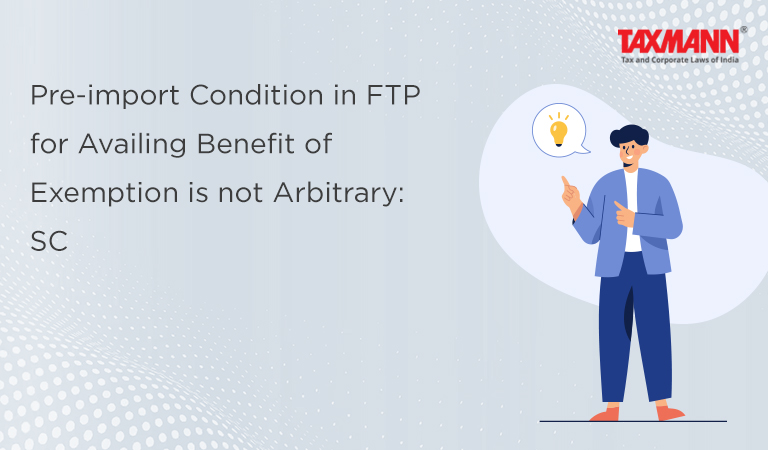Pre-import Condition in FTP for Availing Benefit of Exemption is not Arbitrary: SC
- Blog|News|GST & Customs|
- 2 Min Read
- By Taxmann
- |
- Last Updated on 1 May, 2023

Case Details: Union of India v. Cosmo Films Limited - [2023] 149 taxmann.com 473 (SC)
Judiciary and Counsel Details
-
- S. Ravindra Bhat & Dipankar Datta, JJ.
Facts of the Case
The Directorate of Revenue Intelligence initiated investigation and issued summons to the manufacturers on the ground that exemption claimed from all custom duty levies, including IGST and compensation cess was not admissible. It was argued that exemption was not allowed when goods manufactured were exported first in anticipation of licence/authorisation, with duty-free import against the authorisation having been undertaken later. The assesse approached the High Court against it and challenged the pre-import condition.
The Honorable Gujarat High Court had struck down the ‘pre-import’ condition in Foreign Trade Policy for availing benefit of exemption from levy of integrated tax and GST compensation cess on import under Advance Authorisation (AA) as unconstitutional. The Revenue filed appeal before the Apex Court.
Supreme Court Held
The Honorable Supreme Court noted that inconvenience caused to exporters by paying two duties and claim refunds could not be a ground to hold the ‘pre-import’ condition as arbitrary. Therefore, the Apex Court set aside Gujarat High Court judgment and held that pre-import condition in Foreign Trade Policy for availing benefit of exemption is not arbitrary or unreasonable.
However, the Supreme Court has directed the Revenue to permit the manufacturer-exporters who were enjoying interim orders, till the impugned judgments were delivered, to claim refund or input credit and they shall approach the jurisdictional Commissioner and apply with documentary evidence within six weeks from the date of the judgment.
Disclaimer: The content/information published on the website is only for general information of the user and shall not be construed as legal advice. While the Taxmann has exercised reasonable efforts to ensure the veracity of information/content published, Taxmann shall be under no liability in any manner whatsoever for incorrect information, if any.

Taxmann Publications has a dedicated in-house Research & Editorial Team. This team consists of a team of Chartered Accountants, Company Secretaries, and Lawyers. This team works under the guidance and supervision of editor-in-chief Mr Rakesh Bhargava.
The Research and Editorial Team is responsible for developing reliable and accurate content for the readers. The team follows the six-sigma approach to achieve the benchmark of zero error in its publications and research platforms. The team ensures that the following publication guidelines are thoroughly followed while developing the content:
- The statutory material is obtained only from the authorized and reliable sources
- All the latest developments in the judicial and legislative fields are covered
- Prepare the analytical write-ups on current, controversial, and important issues to help the readers to understand the concept and its implications
- Every content published by Taxmann is complete, accurate and lucid
- All evidence-based statements are supported with proper reference to Section, Circular No., Notification No. or citations
- The golden rules of grammar, style and consistency are thoroughly followed
- Font and size that’s easy to read and remain consistent across all imprint and digital publications are applied



 CA | CS | CMA
CA | CS | CMA
